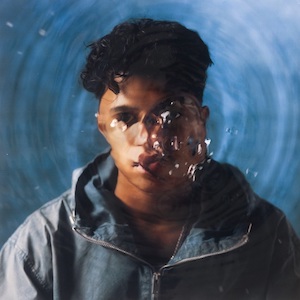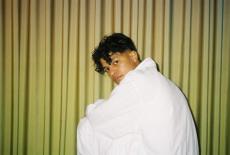Kamal. 来日インタビュー/Interview with Kamal. In Japan
NeoL / 2023年7月10日 17時0分
これまでのストリーミング累計再生回数が2億2500万を超えているUK出身のシンガーソングライター、Kamal.(カマル)が、横浜で開催されたGREENROOM FESTIVAL ’23のために初来日を果たした。2002年にロンドンでカリブ系イギリス人の両親の間に誕生し、多彩な音楽を聴きながら育った少年は、2020年のロックダウンの直前に初のシングル「homebody」をリリース。“家にいるのが好きな人”という意味のタイトルを持つこの曲は、当時多くの人が置かれた状況とシンクロしてバイラルヒットを記録し、世界各国のチャートを賑わせた。ここでは、来日したKamal.にインタビューを行い、これまでの道のりや曲作りへの想い、そして、3月にリリースされた最新ミックステープ『so here you are, drowning』について話を聞いた。
→ in English
――初めての日本はいかがですか?
Kamal.「最高だよ。音楽のおかげで日本にいるなんて、とても非現実的な気分だ。音楽が自分をこんなに遠くまで連れてきてくれたなんてクレイジーなことだけど、新しいカルチャーを吸収できるのは、いつだって素晴らしい経験なんだ」
――まずはバックグラウンドについてお聞かせください。出身はどちらですか?
Kamal.「ロンドンだよ。ノースウェスト・ロンドンのハールズデンで生まれ育った。僕は生まれてからずっと同じ家に住んでいるんだ。自分のアイデンティティは、その大部分が地元の多彩なカルチャーによって占められている気がする。それは僕という人間にポジティブな形で影響を与えてくれた」
――最初に音楽に触れた経験は?
Kamal.「6歳の頃にピアノを習い始めた。クラシックピアノから始めて、コードの組み立て方の基礎を学ぶことができた。C、F、Gといった基本的なコード進行を理解して、それらのコードを繰り返せば、あらゆるポップソングを歌えるんだと気づいた。同じコードでいろんな曲を作ることができるんだな、と。だから、僕はかなり幼い頃から曲を書いていたんだ」
――そんなに早い時期に気づいたなんてすごいですね。
Kamal.「そうだね。それに、僕はかなり幼い頃から音楽活動をしたいと思っていた。大学に進学して、その傍らで音楽活動しようと思っていたんだ。最終的に大学には行かず、フルタイムで音楽活動しているんだけどね」

――音楽を始めたきっかけはクラシックピアノとのことですが、他にはどんな音楽を聴いて育ちましたか?
Kamal.「いろんなジャンルを聴いて育った。両親によく言われるんだけど、母が僕を妊娠していたときはベートーベンをかけていたらしい。お腹の中にいる赤ちゃんにクラシック音楽を聴かせると賢くなる、という記事を読んだみたいで(笑)。それに、うちではよくヒップホップもかかっていた。父はヒップホップが大好きなんだ。帰宅すると50セントの曲が聴こえてきて、僕が部屋に入った途端に『汚い言葉が多すぎるから』と、父が曲を止めていたのを覚えている(笑)。あとはエリカ・バドゥとか、いろんなアーティストの曲が流れていた。多すぎて一瞬では思い出せないくらい、たくさんのアーティストの曲を聴いていたような気がする。父からの影響は大きいと思う。その頃の僕に音楽を聴かせてくれたのは、間違いなく父なんだ。僕は父の趣味をかなり受け継いでいるはずだよ」
――作曲の方法は幼い頃に覚えたとのことですが、実際にはいつ頃から曲作りをしていたのですか?
Kamal.「小学生の頃にウクレレを習っていたんだ。ウクレレ好きな人をディスるつもりはないけど、あれはギターの赤ちゃんのようなものだよね(笑)。もちろん、れっきとした楽器だけど、当時の僕はウクレレをシンプルなギターとして捉えていた。弦は4本だけだし、コードの形もかなり押さえやすいからね。それが僕にとっては大きな一歩となった。ただ曲を書くためのツールとして使っていただけでなく、あの年頃から比較的真剣に取り組んでいたんだと思う。確か6年生だったから、12歳くらいかな」
――実際に初めてリリースした曲は?
Kaamal.「2019年に『demand』と『smilingdownthephone』という曲をリリースした。16歳の頃にマネージャーがSoundCloudで僕を見つけてくれて、それからちゃんとレコーディングするようになったんだ。当時はまだ学生だったから、週末にセッションしていた。それ以来、僕はレコーディングのプロセスに夢中になって没頭している。これまでの人生で最高の出来事の一つだよ」
――BRITスクール出身だそうですね。たくさんの卒業生がアーティストとして活躍されていますが、学校生活はいかがでしたか?
Kamal.「リソースやネットワーク作りに最高の環境だった。ネットワーク作りと言っても、当時はまだ子どもだったから、ただ友だちを作っていただけだけどね。でも、卒業してから、素晴らしい写真やショートフィルムを撮影してくれる友だちがいたり、曲をプロデュースしてくれる友だちがいたり、いろんな楽器でセッションを手伝ってくれる友だちがいたりすることに気づかされた。ロンドンのクリエイティブシーンと繋がりが感じられるのが、とても良いところだと思う」
――「homebody」がバイラルヒットしたときも、まだ学生だったんですか?
Kamal.「まだ学生だった。学校はコロナの影響で1年早く、17歳で卒業したんだ」
――ロックダウン中に多くの人たちの心を動かした「homebody」ですが、実は曲を書いたのはコロナ前だったそうですね。
Kamal.「あの曲は、文字通り家に引きこもるというよりも、自分の頭の中に閉じこもっている状態のメタファーとして書いたんだ。自分が内向的に感じて、家に引きこもっていたいと思う状態について書いた部分も少しはあるけど、それよりも、自分自身の思考の中に閉じこもって、孤独を感じることについて書いた。人と一緒にいても、本当に居心地の良い場所は自分の心の中だけと感じてしまうことを表現したというか。そして、その状態と自分が認識している現実の間に、ある種のレイヤーが存在する時もあるということも。あの時期にリリースされたのは偶然で、僕らは本当に“homebody”(=家にいるのが好きな人)となることを強いられてしまった。それはコロナに関して、僕が感謝している数少ないことの一つなんだ。あのような恐ろしい出来事から、少しでも希望の光を得ることができてうれしかった」
――バイラルヒットしたときは、どう思いましたか?
Kamal.「最高の気分だった。でも、自分が(パンデミックを)予測してしまったのではないかと責任も感じてしまった(笑)。とはいえ、あの曲があの時期を乗り越える上で人々の役に立ったことや、みんなが曲と繋がりを感じてくれたという事実には、非常に感謝しているんだ」

――2021年リリースのEP『war outside』に収録された曲は、ロックダウンの最中に書いたものが多いのですか?
Kamal.「間違いなくその流れだった。収録曲の多くはかなり憂鬱でメランコリックな印象だけど、それはロックダウンによる僕の精神状態を反映しているからだと思う。当時の僕はとても不安を感じていて、それ以前よりも、ずっと不安だったんだ」
――あの頃は誰もがそうでしたよね。
Kamal.「そうだよね。あのEPにも多くの人が共感してくれたんじゃないかな。僕はあのような精神状態と、親密で余計なものを取り除いたアコースティックなヴァイブスを反映したかったんだと思う。収録曲の多くはZoomを使ったセッションを通して作ったんだ」
――これまでに社会不安をテーマにした曲をいくつか書かれていますが、実体験に基づいているのですか?
Kamal.「間違いなく自分自身の経験に基づいているし、同じような経験をしている友人が多いという現実もある。とても悲しいことだけど、僕はそれを音楽やメディアを通して語ることに大きな意味を感じている。“不安のスポークスパーソン”というレッテルを貼られることも多いけど、決して意図的なものではない。僕は曲の中で正直に表現したいと思っていて、これもその一部なんだ。それに、社会不安は音楽を通してシェアできる、最もセラピー的なものだと思う。だから、声を上げているというよりも、かなり自分勝手なものが多くて、むしろ自分自身の問題を解決しようとしているだけなんだよ」
――でも、それによって美しい曲が生まれるんですよね。
Kamal.「確かに、それはボーナスだね(笑)」
――ロックダウンが終わって、新しいミックステープ『so here you are, drowning』の制作はいかがでしたか?
Kamal.「最高だった。より社交的になれたし、音楽業界で新たなコネクションを作ることができて、本当に楽しかった。J Moon、フレッド・ボール、ジョニー・コファー、Congeeなど、とても尊敬しているソングライターやプロデューサーとコラボレーションして、一緒に素晴らしい時間を過ごすことができた。彼らと音楽的にぶつかり合うことができて、本当に楽しかったんだ。自分のアイデアをシェアして、褒めてくれたり、批判してくれたりする人たちがいるということは、アーティストとして成長する上で非常に重要なことだと思う。ロックダウンを終えて、そういった経験ができたことに感謝している。それによって、サウンドも多様化したと思うんだ。いろんな人とコラボレーションすることでさまざまな影響を受けて、以前よりもプロダクション主導の曲ができたから。最新のミックステープでは、それがよくわかってもらえると思う」
――今回のミックステープは、ある本からインスピレーションを得たそうですね。
Kamal.「ケイリブ・アズマー・ネルソンの『Open Water』という本だよ。実はミックステープの最後の曲『drown』で、本からの一節を朗読する著者の声をサンプリングしたんだ。彼があの本に書いた経験と、ミックステープの中で語られる僕の経験には、類似点がたくさんあった。テーマは愛や人間関係で、具体的には若い人やマイノリティ、そして彼の本では、とりわけ黒人の愛が描かれている。僕は彼の本に書かれた多くのテーマに繋がりを感じ、まるで自分に語りかけているかのように、とても私的に感じた。だから、本の一節を自分の声として使っても、支離滅裂に感じないんだ。まだ読んでない人はぜひチェックしてみて。本当に素晴らしい本だから。僕はあの本をきっかけに再び読書するようになって、以前よりもたくさん読んでいるんだ」
――自分の本がインスピレーションとなって音楽が生まれるなんて、著者も喜んだのではないですか?
Kamal.「彼に連絡してミックステープで朗読してほしいと依頼したら、とても喜んでくれた。あの本の素晴らしいところは、音楽そのものに強い繋がりがあるだけでなく、いろんな楽曲が参照されていること。ソランジュとか、僕が尊敬している多くのアーティストに触れている。僕は彼の音楽の趣味が好きだから、音楽にまつわることが一緒にできて光栄だった」
――現在、弱冠20歳ということで、かなりの速さでいろんなことを経験されているかと思いますが、自分を見失わずにいられる秘訣はありますか?
Kamal.「僕が地に足をつけていられるのは、ずっと同じ人たちと一緒にいるからだと思う。彼らは成功する前から僕のことを知っているので、もし変なことをしようとしたら、『君らしくないよ』とちゃんと言ってくれるんだ。それは大切なことだと思う。あとは、もうすぐ実家を出るとはいえ、今でも家族と過ごす時間があること。引っ越したらどうなるかな(笑)。でも、とにかく考え過ぎず、今でも音楽を人々が関心を寄せる大きなものとしてではなく、自分が表現するためのささやかな手段として捉えることで、落ち着いていられるんだと思う」
――今も「homebody」のミュージックビデオに出てくる部屋に住んでいるのですか?
Kamal.「そうだよ。でも実は面白いことに、あのミュージックビデオの部屋は、僕の部屋にそっくりなリメイクなんだ。彼らは大きなバンで我が家にやって来て、僕の部屋からすべてのものを運び出した。そして、同じサイズの部屋を建て、壁を青く塗り、ワードローブなどすべてを追加して、僕の部屋が完璧に再現された。自分の部屋にいるのに実際は倉庫にいるなんて、とても奇妙だったよ。あれは面白い体験だった(笑)」
――今後の予定は?
Kamal.「まだ詳しくは話せないんだけど、いくつかかなり楽しみなコラボレーションが控えているんだ」
――曲は常に書いているんですか?
Kamal. 「僕にとっては日常的なことで、呼吸をしているようなものだよ(笑)。毎晩曲を書いているし、毎日書く必要を感じる。曲全体を書かなかったとしても、断片やフック、コード進行だけでも書いている。自己表現の手段として、僕になくてはならないものなんだ。時には何か目的があって作ったり、作品を手がけたり、特定のテーマで曲を書いたりすることもあるけど、たとえ何もなくても、僕はとにかく何かしら作っているんだ」

photography Kotetsu Nakazato(https://www.instagram.com/kotetsunakazato/)
text nao machida

Kamal.
『so here you are, drowning』
https://virginmusic.lnk.to/shyad
https://www.virginmusic.jp/kamal/

――Nice to meet you. How do you feel to be here in Japan for the first time?
Kamal.: It's amazing. It's very surreal that music is the reason that I'm here. It's crazy that it's brought me this far, but also, it’s just sort of soaking up another culture that is always an amazing experience.
――I would like to start by asking you a little bit about your background. Where did you grow up?
Kamal.: I'm from London. Born and raised in North West London, Harlesden. I've been living in the same house my whole life. I feel like proper part of my identity is like the sort of mesh of cultures there. It really has impacted the person I am in a positive way.
――When did you start playing music?
Kamal.: I started playing piano when I was six years old. I started on classical piano and that gave me the basics of learning how to put together chords. Once I figured the basic chord progression like C, F, G, I realized you can just repeat that and you can sing loads of different pop songs over just those same chords. I was like, that means you can write loads of different songs over the same chords. So I was writing songs from pretty young.
――That’s amazing you learned that pretty quickly.
Kamal.: Yeah, and I think I wanted to do it from when I was really young as well. I always said my plan was to go to university and to do music on the side. But I ended up just not going to university and doing music wholly instead.

――While you started playing music by taking classical piano lessons, what other kind of music did you grow up listening to?
Kamal.: It was proper mix of things. My parents always say that they played Beethoven while my mom was pregnant with me, because apparently, they read a study that it would make you smarter baby if you listen to classical music in the womb [laughs.] Also, a lot of hip hop. My dad's really into hip hop. I remember walking into the house and hear 50 Cent, but when I got inside the house, he would turn it off and he was like, “Too many swear words in it” [laughs.] And Erykah Badu... There are lots of people. I feel like there's almost too many to think of in an instant. But I think a large mix from my dad. My dad is definitely sort of the person who fed me with the music when I was that age. I think I've inherited a lot of his taste.
――You mentioned that you figured out songwriting quite early. So when did you actually start writing songs?
Kamal.: I was getting ukulele lessons in primary school. That was sort of like the baby guitar, but I don't want to dis any ukulele lovers [laughs.] It's still an instrument. But that's sort of how I did it at the time as a simplistic version of them, because it's only four strings, the shapes of the chords are quite easy to play. Again, that was a big step for me. So rather than just having that as a tool to write songs, I think I was taking it relatively serious from about the age. I think I must have been in about year six, so I must have been about 12.
――What was the first song that you released?
Kamal.: In 2019, I had a song called "decline" out and a song called "smilingdownthephone." I started recording properly once my manager really found me on SoundCloud when I was 16. I was still in school at the time, so I'd do sessions on weekends. And from there, I just fell in love with the process and really just committed to it. It's been one of the best things I've done in my life so far.
――I read that you went to the BRIT School. There are many successful artists who went there, but how was it like for you?
Kamal.: It's great for the resources and the networking... I said networking, but we were just kids at the time so it was just making friends. But you come out of the school and you realize that now I have a friend who can take brilliant photographs and make short films, I have friends who can produce songs for me, I have friends who can play different instruments to put in for a session if I need. I think that's a great part of it is just feeling connected in London to the creative scene in general.
――Were you still in school when “homebody” went viral?
Kamal.: Yeah, I was still in school. I graduated at 17 because COVID cut the year off short.
――I found it quite interesting that you actually wrote “homebody” before the lockdown. But it really spoke to many people during that time.
Kamal.: I wrote it as a metaphor for being withdrawn and being in my head a lot, rather than literally being in my home. Bits of it were about literally feeling like you're an introvert and had to stay at home, but a lot of it is more about feeling almost alone in your own thoughts. It's almost to describe being around people and still feeling like the only place you're truly comfortable was within your own mind. And there's a sort of layer between that and the reality that you're perceiving sometimes. It was a coincidence that came out at that time, and then we were also actually homebodies by force. But I think I'm thankful for it. It's one of the few things in COVID that I can say I'm thankful for, and I'm happy to have a small silver lining from such a horrible thing that I can sort of take from it.
――How did you feel when it went viral?
Kamal.: It was an amazing feeling. But also, I felt like I'm almost to blame, like I predicted it [laughs.] But yeah, I'm hugely appreciative of the fact that it could help people through that time, and people could connect with it for that reason.

――I assume that a lot of your first EP “war outside” (2021) was written during the lockdown?
Kamal.: Yeah, it was definitely in that vein. A lot of it is quite somber and melancholy sounding, and I think it's a result of the headspace I was in because of it. I think I was feeling quite anxious, more anxious than I had felt previously in previous years.
――I guess we all did.
Kamal.: Yeah, for sure. I think a lot of people could relate to that again. I think I almost wanted to reflect the headspace and that sort of intimate, stripped back acoustic vibes. A lot of those songs were actually done on the Zoom sessions.
――Some of your songs are about social anxiety. Are they based on your own experience?
Kamal.: Definitely based on my own experiences, and also, I think the fact that I have so many friends who have similar experiences. It's proper sad thing, but I think it makes it even meaningful to speak about in music and media in general. And a lot of the time, I'm branded as almost a spokesperson for anxiety. It's not a purposeful thing whatsoever. It's just part of me being honest in my music, which is how I like to express. And I think they're some of the most therapeutic things to share through music as well. So a lot of it's quite selfish, rather than me actually taking a stand. It's more of me just trying to work through my own stuff.
――But you make beautiful songs from it.
Kamal.: Yeah, it's a bonus [laughs.]
――Now the lockdown is over, what was it like for you to make the new mixtape “so here you are, drowning”?
Kamal.: It was great. I really enjoyed to be able to branch out socially and make new connections within the music industry. I've worked with a few writers who I really respect and some producers who I've had a great time collaborating with like J Moon, Fred Ball, Jonny Coffer and Congee. They're all sort of people that I've really enjoyed engaging with and bouncing off musically, and I think having people to share your ideas with who compliment them or critique them is a really important part of growing as an artist. So I've been thankful for to be able to do that coming out of lockdown. And also, I think just in general diversifying my sound has come hand in hand with that, because I've been collaborating with different people, I've been getting different influences and more production led songs that I previously recorded. And I think that's evident on the on the recent mixtape.
――I read this mixtape is inspired by a book. Could you talk about that?
Kamal.: That book is called “Open Water” by Caleb Azumah Nelson. I actually sampled his voice reading a passage out of it on the last song on the tape called "drown." There were just a lot of parallels in his experiences in the book and my experiences that I'm talking about in the tape. It's about love and relationships, but specifically as a young person, specifically as a minority, and specifically black love in his book. I think I just connected with a lot of the themes in it in a way that felt so personal that I was like, this almost speaks for me. So I can use the passage of it hand in hand in my own voice, and it doesn't feel disjointed at all. I think everyone should check that out if they haven't. It’s a really great book. It got me back into reading again, and since then, I've been reading more.
――The author must be thrilled that you're inspired by his book to make music.
Kamal.: I reached out to him and asked him if he would speak on the tape. And he was proper excited about it. Great thing about that book, as well as it's very connected to music itself, he references a lot of songs, references people like Solange and a lot of other artists that I sort of quite look up to. And because I liked his music taste, it was an honor to be able to do something with him related to music.
――You are only 20 now, and it seems that things happened really fast for you. How have you managed to stay grounded?
Kamal.: I think I've stayed grounded by being around the same people. They are people that have known you before of this, so if you're moving weird, they'd be like, “Come on, that's not you.” And I think that's important. Also, I think still being around my family often, although I'm moving out soon. So we'll see how it goes after that [laughs.] But yeah, I think I've stayed grounded just by not overthinking it, trying to still treat music as my little thing that I do to express, rather than this big thing that people care about.
――Do you still live in that room in the “homebody” video?
Kamal.: Yeah. I still live in that room. But actually, interestingly, that room in the music video is a remake of my room, but it's identical. So they came to my house with a big van, and they took all the stuff from my room. And they rebuilt the proportions, painted the walls blue, added in the wardrobe and everything. They completely rebuilt my room, which is very freaky to be in my exact room but in a warehouse. It was an interesting experience [laughs.]
――What's next for you?
Kamal.: I can’t speak too much on it yet. There are a few collaborations which I'm quite excited about.
――Do you constantly write music?
Kamal.: It's an everyday thing for me, I sort of breathe it [laughs.] It's like every night I'll be writing, everyday there'll be a need. If it's not a whole song, there’d be a snippet or a hook or chord progression or something. I definitely cling on to it as a way to express my feelings. I think there's times where I'm like, let me do something purposeful, let me make a project or let me make a song about this specific thing. But if it's not that, I'm making stuff anyway.

photography Kotetsu Nakazato(https://www.instagram.com/kotetsunakazato/)
text nao machida

Kamal.
『so here you are, drowning』
https://virginmusic.lnk.to/shyad
https://www.virginmusic.jp/kamal/
関連記事のまとめはこちら
https://www.neol.jp/music-2/
外部リンク
この記事に関連するニュース
-
≪韓国ドラマOST≫「ラブ・パッセンジャー ~私たちの恋愛事情~」、ベスト名曲 「Somebody」=歌詞・解説・アイドル歌手
Wow!Korea / 2024年12月23日 10時34分
-
『ロマンシング サガ2 リベンジオブザセブン』煽り気味の皇帝にも注目!ザコとは違う圧倒的な七英雄との対峙【ゲームで英語漬け#153】
Game*Spark / 2024年12月22日 20時0分
-
この英語ってどんな意味?「apple of my eye」
OTONA SALONE / 2024年12月22日 7時0分
-
Ado「11月頭からアメリカで生活しています」 英語でも報告「買い物も一人でできるように...」
J-CASTニュース / 2024年12月3日 12時50分
-
New 7me 【shichi-me】 Seven Blend Spice Now on Sale!
共同通信PRワイヤー / 2024年11月29日 17時0分
ランキング
-
1ワークマンを長く愛用する人が買って良かった「防寒ウェア」3選 ほぼ毎日着ている“蒸れにくい防寒ジャケット”など
Fav-Log by ITmedia / 2024年12月27日 19時15分
-
2「安すぎない?」【IKEA】で破格の"100円モーニング"やってる...。ドリンクバーも無料にする方法があってお得すぎ。《編集部レポ》
東京バーゲンマニア / 2024年12月27日 19時31分
-
3こんな人は要注意!貧乏神に好かれてしまう人に共通する「見た目の特徴」3つ
オールアバウト / 2024年12月27日 21時40分
-
4『靴下屋』公式SNSが炎上、中の人から漏れ出る“自我”が火種に「すき屋やドンキも過去に物議」
週刊女性PRIME / 2024年12月27日 18時30分
-
5美容室に行くとき、“着てはいけない服”ってあるの? 素朴な疑問を現役美容師に聞いてみた
オトナンサー / 2024年12月27日 20時50分
記事ミッション中・・・
記事にリアクションする
![]()
記事ミッション中・・・
記事にリアクションする

エラーが発生しました
ページを再読み込みして
ください











